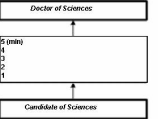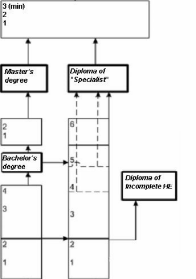ВУЗ: Не указан
Категория: Не указан
Дисциплина: Не указана
Добавлен: 28.07.2024
Просмотров: 75
Скачиваний: 0
Text A
Higher Education in Russian Federation
After finishing secondary school and taking the Unified State Examination, students can enter higher education institutions (HEIs): universities, academies, and institutes. Admission for students is competitive and HEIs use the Unified State Examination results. Students can apply simultaneously to several institutions all over the country.
There are different forms of education: fulltime, evening and correspondence. While the higher education in Russia is mostly free of charge, HEIs admit a significant number of tuition-paying students.
Attendance of classes in HEIs is mandatory. The academic year consists of two semesters. At the end of each semester students take exams. The course mark is determined by the final examination mark in that subject. Other courses may be evaluated as pass/fail. Budget students with high examination results receive scholarships.
The first- and second-year students get knowledge in fundamental sciences such as mathematics, physics, chemistry and the humanities, for example, foreign languages, history, philosophy and others. In senior years students receive specialized education. After four years of study students defend a Diploma project, pass the finals and get the Bachelor’s Degree.
The Bachelor's degree gives access to the Master's degree. It is a two-year course. Students must defend a thesis and pass the finals.
The traditional qualification of a Specialist diploma opens access to professional practice and is awarded after five-year studies.
The Candidate of Sciences is the first doctoral degree in the Russian educational system and is awarded in all disciplines. It is focused on research and university teaching. The Doctor of Sciences is the highest academic degree in the Russian Federation.
Notes:
Higher Education Institution (HEI) – Высшее Учебное Заведение (ВУЗ)
Unified State Examination (USE) – Единый Государственный экзамен (ЕГЭ)
Bachelor’s Degree – степень бакалавра
Master’s Degree – степень магистра
Candidate of Sciences – кандидат наук
Doctor of Sciences – доктор наук
Higher Education Structure in the Russian Federation


Vocabulary on the text
to admit [ əd ́ mıt] - допускать; принимать
∽ admission [əd ́mı∫(ə) n] – прием ( в учебное заведение)
to apply [ə ́ plaı] – 1. подавать заявление
2. применять(ся), использовать
to enter an academy (a university, an institute) – поступать в академию
(университет, институт)
competitive [kəm ́ petıtıv ] – конкурентный; конкурсный
full-time (evening, correspondence) study – дневное (вечернее, заочное)
обучение
attendance [ə ́tendən(t)s] - посещаемость
scholarship [ ́ skolə∫ıp] - стипендия
academic year – учебный год
free of charge - бесплатно
tuition [t(j)u ́ ı∫(ə)n] – 1. обучение
2. плата за обучение
11. mandatory [ ́mændət(ə)rı] – обязательный, принудительный
12. mark (амер. grade) – балл, отметка; оценка (знаний)
13. to evaluate [ı ́væljueıt] – оценивать, давать оценку
14. pass / fail - зачет/ незачет
15. humanities [hju:́ mænətız] – гуманитарные науки
16. to take an examination (exam) – сдавать экзамен
∽ to pass an examination – сдать экзамен
∽ to hold (held) an examination – проводить экзамен
17. to defend a thesis [ ́Өi:sıs] – защищать диссертацию
18. access [ ́ ækses] - доступ
19. to award [ə ́ wɔ:d] - присуждать
20. research [rı ́ sə: ʧ] – (научное) исследование
21. the finals - выпускной экзамен (по окончании учебного курса на степень бакалавра
или магистра)
Text Work
Ex.1 Practise the pronunciation of the following words. Pronounce them with the following tone.
|
/ әe / |
/e / |
/ ɪ / |
/ ʌ / |
/ ɔ / |
|
academies practical exams Bachelor mathematics humanities practice access mandatory |
secondary competitive academic semesters sessions end fundamental chemistry specialized professional defend several attendance |
finishing institutes different physics history tuition admit admission significant discipline consists
|
subject other studies number results budget
|
correspondence knowledge foreign philosophy project doctoral
|
|
/ a: / |
/ u: / |
/ i: / |
/ ɔ: / |
/ ә: / |
|
classes pass example Master charge |
Unified students institutions full |
evening each degree senior receive complete thesis free
|
forms course awarded |
determined research |
|
/ aɪ /
|
/ eɪ / |
/ aɪ / |
/ ɔu / |
/ aɪə / |
|
apply |
State education examination training grade evaluated fail qualification simultaneously |
final while type high |
diploma programme focus |
higher sciences |
Ex.2. Give the English for:
прием; бесплатно; учащиеся на коммерческой основе; учебный семестр; получать знания; высшая академическая степень; первокурсники; иностранные языки; итоговая экзаменационная оценка; значительное количество; получать стипендию; разные формы обучения; оцениваться как зачет/незачет; поступать в несколько вузов одновременно; использовать результаты ЕГЭ; основные науки; на старших курсах; сдавать выпускные экзамены; защищать дипломный проект; двухлетний курс; система образования; получать специальное образование; дневное обучение.
Ex.3. Answer the questions on the text:
What are three major types of higher education institutions in the Russian Federation?
How do students apply to HEIs?
What are the main forms of education?
Do Russian students pay for their education?
How many semesters is the academic year divided into?
How are courses evaluated?
What subjects do the first- and second-year students study?
When do students get the Bachelor’s Degree? the Master’s Degree?
When is a Specialist diploma awarded?
What doctoral degrees are there in the Russian educational system?
Ex.4. Agree or disagree with the following statements:
Students can apply only to one higher education institutions.
The higher education in Russia is free of charge.
All the students receive scholarships.
All the courses are evaluated as pass/fail.
The first- and second-year students receive specialized education.
After four years of study students get the Bachelor’s Degree.
The Bachelor’s Degree is a two-year course.
Students get a Specialist diploma after 5 years of studies.
To get the Master’s degree students must defend a thesis.
The Candidate of Sciences is the highest academic degree in the Russian Federation.
Section: Word Study
Ex.1. Read and translate the following international words:
university, form, student, academic, semester, course, final, fundamental, mathematics, philosophy, physics, specialized, traditional, doctoral, exam, budget, class.
Ex.2. Find the pairs of synonyms. Translate them into Russian:
tuition a) grant
specialized b) various
mark c) a few
admission d) usual
mandatory e) fee
budget students f) grade
fundamental g) together
receive h) state-supported students
several i) dissertation
scholarship j) specific
thesis k) get
traditional l) significant
simultaneously m) entrance
different n) compulsory
Ex.2. Match the parts of the phrase. Translate the phrases into Russian:
|
|
|
|
|
|
|
|
|
|
|
|
|
|
|
|
|
|
|
|
|
|
Ex.3. Use the words/ phrases below to complete each of the following sentences:
|
diploma, mark, academic year, scholarships, senior, tuition, semester, thesis |
You need at least one semester to write your ________.
________ at the university is high so I will need my parents’ help.
I have to take four exams next ________.
Budget students with high examination results receive _______.
You will get an excellent _____ if you don’t miss lectures.
The ________ in different universities can range from 7 to 10 months.
After four years of studies students defend a ______ project.
________ students receive specialized education.
Ex.4. Find a word to match these definitions:
|
tuition, to fail, degree, diploma, scholarship, academic year, mark, the finals |
to receive an unacceptable grade; the last examination of an academic course; a standard number or letter indicating a student’s level of performance; an award of financial aid for a student to further his or her education; a certificate of completion for a degree; the period of formal instruction at a university; an academic title awarded to a student who has completed a course of study; the money charged by an institution for instruction and training.
Ex.5. Idioms:
to pull an all-nighter = to study all night
to hit the book = to study very hard
to cut class = to miss class
to check out books = to borrow books from the library
to ace (an exam, a test) = to get a very high score on a test
Translate the following sentences into Russian:
I have to do my best to ace the test; otherwise I won’t get an excellent mark.
I can’t believe you cut class on Thursday to sleep in, with all these absences that you have.
I had to pull an all-nighter to get ready for the final exam.
You need a library card to be able to check out books.
My friend has to hit the books tonight to get ready for his physics exam.
Discuss the following questions with your partner:
Who often cuts classes in your group?
Did you pull an all-nighter before your exams?
How often do you check out books?
Was it difficult to ace a grammar test?
Do you always try to hit the book?
Ex. 6. Study the table. Read and translate the sentences.
|
American English |
British English |
|
freshman |
a first-year student |
|
sophomore |
a second-year student |
|
junior |
a third-year student |
|
senior |
a fourth-year student |
In a freshman year students become familiar with college entrance requirements.
Sophomores start collecting college information.
In a junior year students often get a part-time job, start or update an academic resume.
In a senior year students begin their college essays.
Exam preparation begins on the first day of class. This is one of the most important pieces of information for a college freshman to understand.
Word Building
Ex.1. Fill in the missing verbs or nouns: